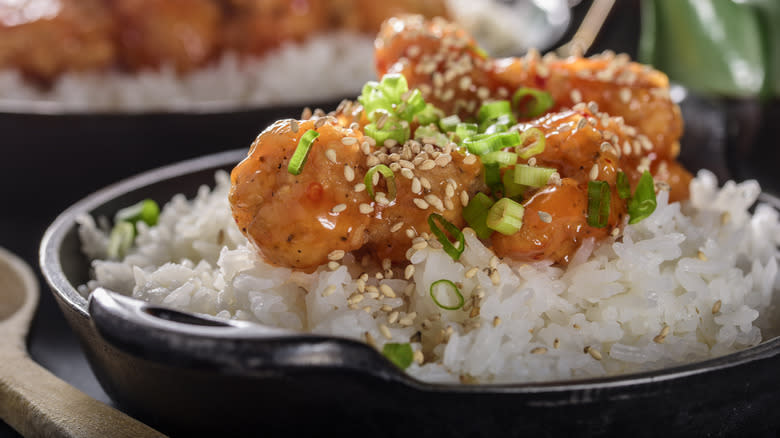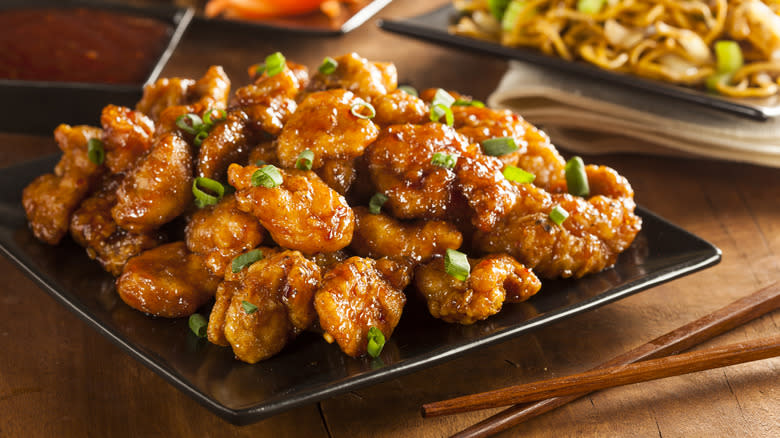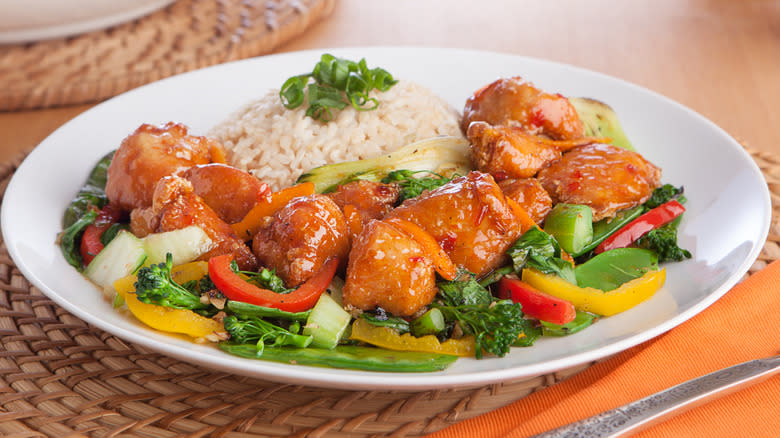The Hawaiian Origins Of Classic Orange Chicken

When it comes to American Chinese takeout, orange chicken reigns supreme. The dish is popular among customers and helped put Panda Express on the map in a lot of respects. However, as you may have suspected all these years, orange chicken isn't authentic Chinese food. You won't find it on the menu if you go to Beijing, Shanghai, or any other Chinese city. Instead, the origins of orange chicken, similar to Panda Express, are uniquely American. Customers should cast their gaze to the island state of Hawaii.
Executive chef Andy Kao invented orange chicken in Hawaii in 1987, having ventured there to lend a hand in opening the state's first Panda Express. The chain was expanding following its success after opening its inaugural restaurant in 1984 in Glendale, California. The chef got the idea to combine fried chicken with a sweet and tangy sauce, partly from being inspired by the flavor profiles of the American Taiwanese dish General Tsao's chicken. Kao adapted flavors that Chinese immigrants developed in the 1800s, when they began using orange peels in their dishes as a way of heightening the flavors.
Kao's original orange chicken didn't have breading and featured a whole piece of chicken with a bone. Panda Express soon dropped the bone due to customer preference. Co-founder Andrew Cherng explained to NPR, "It was selling so well, except people said, you know, 'Same flavor, do it without the bone.' OK, so there comes orange chicken." The restaurant had a hit on its hands.
Read more: The Ultimate Ranking Of The Best Fried Chicken Chains
Orange Chicken Took Panda Express To New Popularity

Panda Express rose to dominance during a time in which Chinese restaurants began to alter their menus. These restaurants started offering sweet options, adding sugar and cornstarch to their meats, which appealed more to American consumers. Panda Express orange chicken thrived at this point, quickly becoming customers' go-to option. It's telling that orange chicken remains the best-selling Panda Express meal all these years after its introduction.
According to chef Jimmy Wang, orange chicken's popularity is thanks to its balancing act. Speaking with NPR, the Panda Express chef explained that orange chicken adopts the Chinese philosophy of yin and yang -- two opposites existing in balance. The dish includes sweetness through brown sugar and honey, but it also has a tanginess on display thanks to its soy sauce and black vinegar. Wang explained, "You want to draw out tingling sensation with heat, with garlic, with ginger."
Panda Express sells around 115 million pounds of orange chicken annually. For those who practice veganism or vegetarianism, the chain even partnered with Beyond Meat to create a meatless version of the dish. And orange chicken has proved so popular it inspired its own holiday: National Orange Chicken Day began in 2017, and is celebrated annually on July 15. However, the dish has also proved prone to criticism, as well.
The Issues Over Authenticity

Through the lens of Chinese Americans, orange chicken can be a bit controversial, with the issues of authenticity and cultural appropriation prevalent. Some Chinese Americans expressed disdain for the dish in a 2015 BuzzFeed video, calling orange chicken "White people's Chinese food." Their opinion isn't uncommon. The Takeout writer and Chinese immigrant Kevin Pang detailed the hate that his family had for the dish growing up, so much so that he didn't try orange chicken for the first time until he was an adult. Few customers believe that orange chicken is authentic to China. However, critics of the dish believe it damages public perception of Chinese food.Historian Miranda Brown told NBC, "The problem with orange chicken for a lot of Chinese Americans is that it reinforces the impression that Chinese food is just cheap eats — it's greasy and not very gourmet. But it begs the question: Is the food itself the problem? Or is it that people have a problem with the kinds of stories that are attached to the food?" What complicates the narrative more is that co-founders Andrew and Peggy Chern were born in China and Burma. While the restaurant may be Americanized, it was founded by Asian immigrants wanting to spread their traditions to customers.
Although not traditional in Asia, food historians and critics argue that over time orange chicken has developed its own authenticity. Regardless of opinions of the dish itself, it's hard to argue with its impact across America.
Read the original article on Daily Meal.

 Yahoo Lifestyle
Yahoo Lifestyle 
